Missed opportunities
IBSA’s abstention over Syria is an argument against Security Council reform. Critics of reform have long argued that increasing the number of permanent members to include Brazil and India would lead to paralysis.
 Courtesy: Pragati
Courtesy: Pragati
IBSA’s abstention over Syria is an argument against Security Council reform. Critics of reform have long argued that increasing the number of permanent members to include Brazil and India would lead to paralysis.
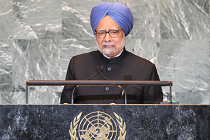 Courtesy: PMO
Courtesy: PMO
Indian Prime Minister Manmohan Singh’s speech at the UN General Assembly has put Indian perceptions on the record and clearly outlined India’s independent foreign policy. India came out unequivocally in support of the Palestinian struggle & reiterated its traditional stance of respecting countries’ sovereignty.
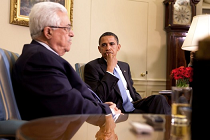 Courtesy: www.whitehouse.gov/WikimediaCommons
Courtesy: www.whitehouse.gov/WikimediaCommons
Repeated applause greeted Palestinian Authority President Mahmoud Abbas' speech to the UN General Assembly, asking for support for the “establishment of Palestine.” But with the U.S. backing Israel, under almost all circumstances, will Abbas' proposal be able to bring about any change?
Corruption has become a galling global phenomenon: structured, vertically-integrated networks, whose objective is the extraction of resources, are forming in countries around the globe. And strikingly, these structures are masquerading as democratically-elected, seemingly-open governments.
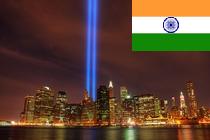 Courtesy: WTCTributeinLight/WikimediaCommons
Courtesy: WTCTributeinLight/WikimediaCommons
A change has come about after 9/11: the ideologies grouped as “Al Qaeda” has morphed, from a group directed by a few individuals, it is now disaggregated. Due to this change, NATO is empowering it's future foes in the Arab world by its continued belief in the camouflaged jihadis.
Former Indian Ambassador to Syria, Rajendra Abhyankar, speaks to Gateway House’s Samyukta Lakshman about the developments in Syria, the impact on India-Syria relations and the future of the region.
 Courtesy:
Courtesy:
A decade after 9/11, the U.S. has prevented further terrorist attacks - a major achievement. But with a $1.3 trillion budget deficit, a debt downgrade, and 24 million Americans searching for jobs, the U.S. needs to attend to matters at home rather than intervening in the world's affairs.
 Courtesy: NilgunGulcan/WikimediaCommons
Courtesy: NilgunGulcan/WikimediaCommons
The AKP’s reaction to this spring’s uprisings in the Middle East seemed haphazard at times. But a closer look reveals that the party was actually learning to balance hard regional interests with its stated values – as all major powers must do.
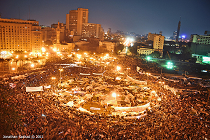 Courtesy: JonathanRashad/Flickr
Courtesy: JonathanRashad/Flickr
As the Arab world remains engulfed in protests, there may be lessons to be learned from other recent democratic converts. Latin America’s growth story may provide the Arab world with some recommendations on how to address socio-economic issues in the post-revolution scenario.
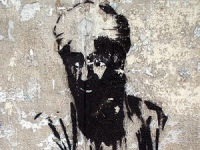 Courtesy: openDemocracy/Flickr
Courtesy: openDemocracy/Flickr
The circumstances involved in the execution of Osama bin Laden make clear the connections between the Pakistan military and the Taliban-Al Qaeda. Will it finally slow the U.S. descent down the Wahabi-friendly trail?